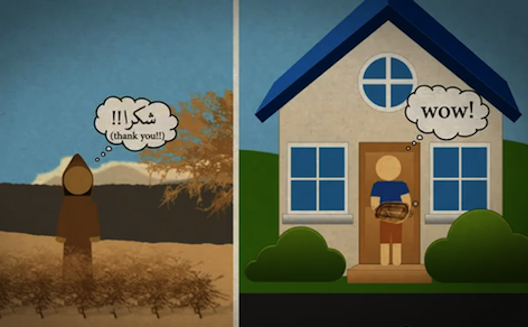Empowering Moroccan artisans to sell on Etsy and Ebay


With the success of Etsy and Ebay, artisans can now become entrepreneurs more easily and market their products to a large global audience. The only glitch for entrepreneurs around the world is that they have to speak and write English.
Some NGOs have worked to fill the gap, by helping artisans select, price, and post products online, but in that case, the artisans remain dependent upon volunteers; it's not a sustainable system. Now, two ex-Peace Corps volunteers have come up with a new solution in Morocco that empowers artisans to sell their products online independently.
“We want to change fairtrade to what it should be”
This August, after two years of working with Moroccan artisans, Dan Driscol decided to partner with Tom Counsell, an other Peace Corps volunteer, to launch The Anou, a mobile website that allows craftsmen and women to post their products on Ebay or Etsy even if they don't know how to read, write, or use a computer.
The goal is to make the process utterly simple, while opening new possibilities. “The world doesn’t need another e-commerce website,” says Counsell; it needs to let isolated artisans participate.
“Now that we have Internet coming to remote parts of the world, and almost anyone using cellphones, the need [for fair trade organizations] is lessening,” he believes. “Fair trade should be just free market trade. There’s no need for things to be labeled fair if it’s just run by the artisans themselves,” he adds, meaning that buyers can circumvent going through a Fair Trade organization by contacting the sellers directly.
No need for volunteers anymore
 Once artisans learn how to use the platform,
they're set.
Once artisans learn how to use the platform,
they're set.
For this, Brahim Mansouri and Rehba
Akkoui, two local
artisans-turned-trainers, come to villages to meet with artisans'
cooperatives. Those cooperatives usually gather 5 to 35 artisans
but only a handful of them will represent the cooperative and use
the platform. Mansouri and Akkoui teach those artisans how to use a
smartphone and handle logistics, and gather information to fill out
those artisans and the products' profiles that will be displayed on
the site.
From there, artisans can add products themselves via the simple
word-free, picture-based mobile website. Products
are automatically posted, in English, on The Anou’s website, Ebay
and Etsy.
When someone places an order, the artisans then receive an
automated text with necessary logistics information (products,
quantities, name and shipping address), which they can bring to the
post office to package and send their items.
Thus far, after six months of beta testing, Mansouri and Akkoui
have trained 200 artisans within 50 cooperatives. Some have a
smartphone at their disposal; other plan on investing in one by
chipping in, asking for a micro-credit or getting the help of an
NGO.

A sustainable model?
The two founders seem to have the logistics (from payment to free return) all figured out. Their approach also follows Lean Startup principles, as they focus on:
1. Cutting costs and making the program local. The two Americans have designed the program so that they will step out by January, leaving Mansouri in charge.
2. Experimenting. When The Anou grows and new problems arise, the team will find solutions by taking artisan and the client feedback into account.
Now, the pressure is on Mansouri, who, only a year ago, worked as a small artisan in a remote Moroccan village. Can he become the CEO of an organization that will represent 250 artisans by the end of December?
Counsell is confident that the plan will work if the founders
can determine a solution for tech maintenance. The one thing he never mentions, however, is
marketing. He and Driscoll believe that a word-of-mouth powered by
Etsy and Ebay will do the trick.
Ever since the beta launch, The Anou has sold $4500 worth of
products. The question now is: will they be able to grow their
service without any marketing?


